句法翻译
句法翻译
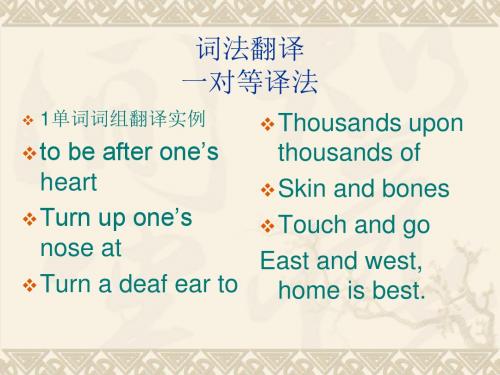
He witnessed ①the sixth②postwar③ ecnomic crisis ④of serious consequence ⑤in the USA. 这三个县经历了①那场②中国③七十年 代④第四次⑤极为严重的⑥遍及数省的⑦ 自然灾害.
二断句译法 It is certain that man will eventually solve the riddle of UFO.(拆开名词从句) Three rains has passed and it was that lean season when the villages store of grain and other dried foods from the last harvest as almost gone. (拆开定语从句) Afer singing a concert in the city, he said he wanted to greet his admirers.(拆开壮语从句)
他每天都要处理很多棘手的问题. He has many hot potatoes to handle everyday. 他新雇来的用人懒得出奇,饭量倒很大,真是个无用而累赘的 东西. His new emplyed servant was lazy and eats a lot,no more than a white elephant. 这个男孩真粗心,他的书已经折角了. The boy is too careless,all the books are dog -eared. 你不要过早乐观. Don’t count the chikens before they are hatched.
考研英语翻译第四章 翻译方法与技巧(句法)

第四章翻译方法与技巧(句法)第一节分句法与合句法翻译英语句子时,有时我们可将原文的句子结构整个保存下来或只稍加改变;但是不少情况则必须将原来的句子的结构作较大的改变。
分句法是指将原文的一个简单句译成两个或两个以上的句子;合句法则是把原文两个或两个以上的简单句或一个复合句在译文中用一个单句来表达。
一.分句法1、将原文中的一个单词译成句子1)They, not surprisingly, did not respond at all.他们根本没有答复,这是不足为奇的。
(将一个副词译为一个句子)2)That region was the most identifiable trouble spot.那地区是个麻烦的地方,这是大家最容易看得出的。
(将一个形容词译为一句子)2、将原文中一个短语译成句子1)Sunrays filtered in wherever they could, driving out darkness, and choking the shadows.阳光射入了它能透过的几乎所有地方,赶走了黑暗,驱散了阴影。
(将一个分词短语译为句子)能量既不能被创造也不能被消灭。
这是一条普遍公认的规律。
(将一个名词语译为一个句子)3、将一个句子拆开译成两个或两个以上句子His failure to observe the safety regulations resulted in an accident to the machinery.因为他没有遵守安全规则,机器出了故障。
(将一个句子译为一个主句和一个从句)二、合句法1、将原文中两个或两个以上的简单句译成一个单句His father had a small business in the city of Pisa. This city is in the north and near the sea.他的父亲在意大利北部近海的比萨做小生意。
(将两个单句译为一个单句)2、将原文中的主从复合句译成一个单句When I negotiate, I get nervous. When I get nervous, I eat.我在谈判时总是有些紧张。
英汉句法翻译(分句、合句与长句)
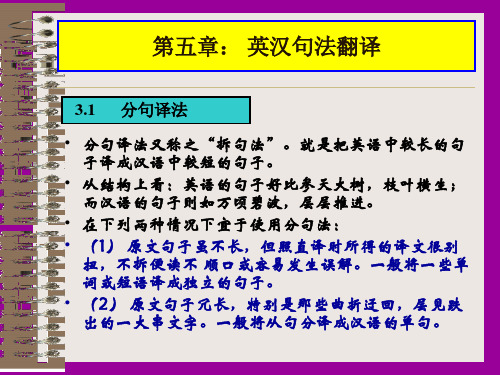
3.1 分句译法
• 分句译法又称之“拆句法”。就是把英语中较长的句 子译成汉语中较短的句子。
• 从结构上看:英语的句子好比参天大树,枝叶横生; 而汉语的句子则如万顷碧波,层层推进。
• 在下列两种情况下宜于使用分句法: • (1) 原文句子虽不长,但照直译时所得的译文很别
扭,不拆便读不 顺口或容易发生误解。一般将一些单 词或短语译成独立的句子。 • (2) 原文句子冗长,特别是那些曲折迂回,层见跌 出的一大串文字。一般将从句分译成汉语的单句。
• 4. He shook his head and his eyes were wide, then narrowed in indignation.
• 他摇了摇头,两目睁得圆圆的,接着又眯成一条线,脸 上露出了愤怒的神色。
3.1.2 将词组或短语译成汉语的句子
• 1.I wrote four books in the first three years, a record never touched before.
• 由于受到顽强抵抗,吹嘘能在几个小时内就占领要地的敌人甚 至还没有能占领外围地带,这一事实使我增强了信心。
指代它,与主句的其他 成分连句成文。
got to know the real people of Egypt.
• 英国人在埃及呆了那么多
年,却从来没有真正了解
埃及人,这是异乎寻常的。
4. It’s quite probable that he is gone.(他已经走了,有那一是条很举可世能的公。)
3.3.1 切断法(顺序法)
• 所谓切断法,就是按英语句子的语序把英语长句“化整为零”, 按意群将长句断开译成若干汉语分句。如:
翻译技巧:句法翻
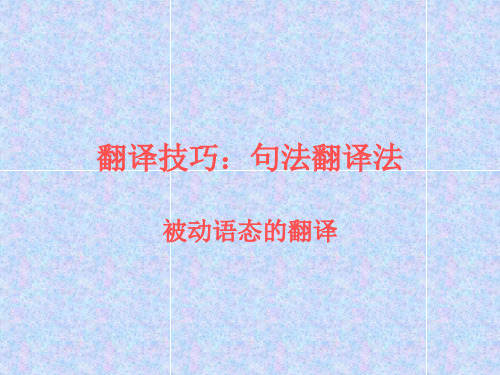
二、译成汉语无主句
• Measures have been taken to prevent the epidemic from spreading quickly. • 已经采取了措施来防止这种流行病迅速蔓延。 • Water can be shown as containing impurities. • 可以证明,水含有杂质。 • The unpleasant noise must be immediately put an end. • 必须全部停止这种讨厌的噪声。
• I finished my task just now. • My task was finished just now (by me).
• The farmers plant many apple trees there. • Many apple trees are planted there (by the farmers).
四、译成汉语被动句
• 使用“被、受、遭、让、给、由、把、得到、受到、加以、得以、 为...所、由...来”等等。 • The minister was found to have appropriated government money. • 部长被发现挪用公款。 • He had been fired for refusing to obey orders from the head office. • 他因拒绝接受总公司的命令而被解雇了。 • The schoolboy was knocked down by a minibus when crossing the street. • 那名男生在穿过街道时让一辆小公共汽车撞倒了。 • He was praised by his teacher. • 他得到了老师的表扬。 • Problems should be resolved in good time. • 问题应及时加以解决。
句法翻译
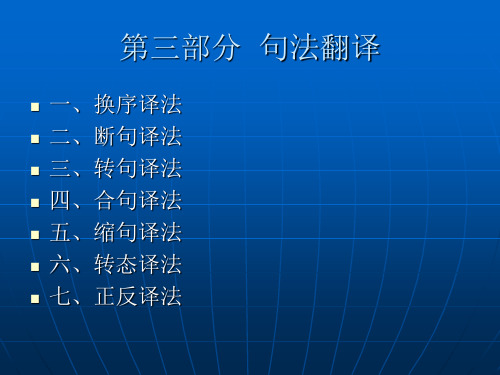
As relations between China and Australia develop, the continuing importance of expanding trade will be balanced by the development of close contact over a broad range of political issues. 随着中澳关系的发展,扩大贸易仍将是重要的, 相应地还要在一系列广泛的政治问题上展开密切 的联系。 注:译者恰当地把英语动词balance译成 “相应 地”,同时,把主句译成汉语的并列句。
国别定语时间定语次第定语判断性定语陈述性定语本质性定语中心词我们为顾全大局于同年秋末在第三方的调停下开诚布公地多次强烈要求贵方赔偿我们的一切损失
第三部分 句法翻译
一、换序译法 二、断句译法 三、转句译法 四、合句译法 五、缩句译法 六、转态译法 七、正反译法
一、换序译法
4) 发生了这样的事不是你的错。It’s not your fault that this has happened. (×That this has happened is not your fault. 这样翻译过于正规,在 文体上与原文不符。)(主语从句换序) 5) 她每天早上教我们学法语。She teaches us French every morning. (×She every morning teaches us French.)(状语换序) 6) 一直在一旁观看的小学生们开始鼓起掌来。The pupils that had been watching started to applaud. (×The always watching pupils started to applaud.)(定语从shing thunderstorm, with thick rain hissing down from skies black as night, stopped Victor Henry from leaving the White House. (Herman Wouk: The Winds of War) 轰隆几声雷响, 从漆黑的天空哗啦啦下起大雨来。维克多· 亨利无法离开 白宫。(主语转句) 2) After an hour, the trail took them by a low, spreading tree strung thickly with beads. (Alex Haley, Roots) 走了一个时辰光景,他们走到了一棵矮 矮的枝繁叶茂的树旁,树上密密麻麻地挂满了念珠。(定 语转句) 3) I tried vainly to put the pieces together. (Helen Keller: The Story of My Life) 我想把这些碎 片拼在一起,可是拼不起来。(状语转句)
句法翻译法

句法翻译法第一节名词性从句的翻译一、主语从句1、以what, whatever, whether, when, where, how, why等引导的主语从句,在翻译的时候,一般可以按照英语原文顺序来翻译。
(举例)What he told me was only liesWhen we can begin the journey is still a question.2、用it作形式主语的主语从句,可以把主语从句放到汉语句子的最前面翻译。
为了强调,it一般可以译出来, 翻译成“这”;如果不需要强调,it也可以不译出来, (但一定要采取颠倒语序倒着翻译!!!)(举例)It doesn’t make much difference whether he attends the meeting or not.It seemed unbelievable that the pilot could have survived the crash.题二、宾语从句1.用that, what, how, when, which, why, whether, if等引导的宾语从句,在翻译成汉语的时候,一般不需要改变它在原句中的顺序。
(举例)I told him that because of the last condition, I’d have to turn it down.Can you hear what I say?I don’t know that he swam across the river.I don’t know how he swam across the river.He has informed me when they are to discuss my proposal.2.用it作形式宾语的句子,在翻译的时候,that所引导的宾语从句一般可以按英语原文的顺序来翻译;it有时候可以不用翻译。
英汉互译第四单元 句法翻译(学生补充练习2)
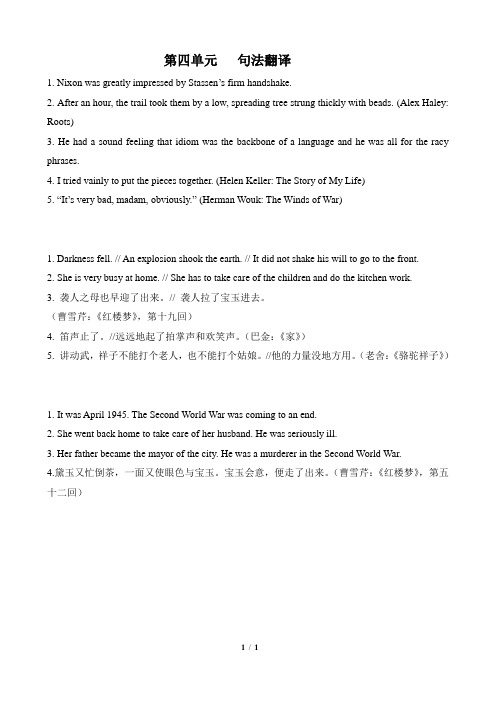
第四单元句法翻译1. Nixon was greatly impressed by Stassen’s firm handshake.2. After an hour, the trail took them by a low, spreading tree strung thickly with beads. (Alex Haley: Roots)3. He had a sound feeling that idiom was the backbone of a language and he was all for the racy phrases.4. I tried vainly to put the pieces together. (Helen Keller: The Story of My Life)5. “It’s very bad, madam, obviously.” (Herman Wouk: The Winds of War)1. Darkness fell. // An explosion shook the earth. // It did not shake his will to go to the front.2. She is very busy at home. // She has to take care of the children and do the kitchen work.3. 袭人之母也早迎了出来。
// 袭人拉了宝玉进去。
(曹雪芹:《红楼梦》,第十九回)4. 笛声止了。
//远远地起了拍掌声和欢笑声。
(巴金:《家》)5. 讲动武,祥子不能打个老人,也不能打个姑娘。
//他的力量没地方用。
(老舍:《骆驼祥子》)1. It was April 1945. The Second World War was coming to an end.2. She went back home to take care of her husband. He was seriously ill.3. Her father became the mayor of the city. He was a murderer in the Second World War.4.黛玉又忙倒茶,一面又使眼色与宝玉。
汉英翻译2-句子的翻译
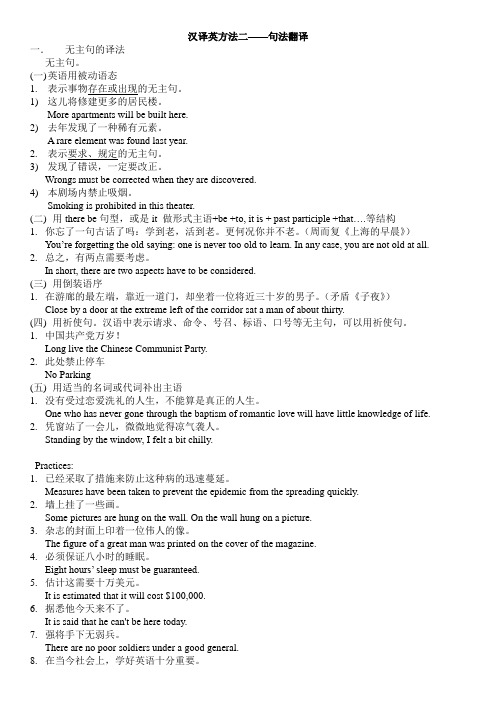
汉译英方法二——句法翻译一.无主句的译法无主句。
(一)英语用被动语态1.表示事物存在或出现的无主句。
1)这儿将修建更多的居民楼。
More apartments will be built here.2)去年发现了一种稀有元素。
A rare element was found last year.2.表示要求、规定的无主句。
3)发现了错误,一定要改正。
Wrongs must be corrected when they are discovered.4)本剧场内禁止吸烟。
Smoking is prohibited in this theater.(二)用there be句型,或是it 做形式主语+be +to, it is + past participle +that….等结构1.你忘了一句古话了吗:学到老,活到老。
更何况你并不老。
(周而复《上海的早晨》)You’re forgetting the old saying: one is never too old to learn. In any case, you are not old at all.2.总之,有两点需要考虑。
In short, there are two aspects have to be considered.(三)用倒装语序1.在游廊的最左端,靠近一道门,却坐着一位将近三十岁的男子。
(矛盾《子夜》)Close by a door at the extreme left of the corridor sat a man of about thirty.(四)用祈使句。
汉语中表示请求、命令、号召、标语、口号等无主句,可以用祈使句。
1.中国共产党万岁!Long live the Chinese Communist Party.2.此处禁止停车No Parking(五)用适当的名词或代词补出主语1.没有受过恋爱洗礼的人生,不能算是真正的人生。
- 1、下载文档前请自行甄别文档内容的完整性,平台不提供额外的编辑、内容补充、找答案等附加服务。
- 2、"仅部分预览"的文档,不可在线预览部分如存在完整性等问题,可反馈申请退款(可完整预览的文档不适用该条件!)。
- 3、如文档侵犯您的权益,请联系客服反馈,我们会尽快为您处理(人工客服工作时间:9:00-18:30)。
6,SVA I live in Wuhan. He will be flying to Shanghai. 7,svoA He put the salt on the table. He treated her vilely
句子切分
Category II contains only four items,/ and I shall say no more about them/ except that, (since they are under consideration), we shall not let the grass grow under feet, / but attempt, (as early as possible), to arrive at a common understanding/ in the interest of humanity. 第二类只包括四个项目,\ 我不想多说,\ 除了, (因为它们都已在审议之中,)我们应该不失时机, \但是力图尽快取得共识,\ 为了人类的利益。 第二类只包括四个项目,而且都已在审议之中。为 了人类的利益,我们应该不失时机,力图尽快取得共 识。除此之外,别的我不想多说了。
例3. (1)The Prime Minister stepped off the plane. (2)Journalists immediately surrounded her. (3)She was immediately surrounded by journalists. 讲英语国家的人会选择(1)与(3)连接,因为(3) 中的She与上句的The PrimeMinister是同一 主位,在(3)中是已知的信息。如果与(2)连接, 两个句子的出发点转换就不自然,当读者头脑 里建立起Prime Minister是谈话的中心时候, 突然第二个分句的话题变成了journalists.
9)选择句(或者….或者…,不是….就是…., 要么….要么…., 是….还是….) 3. 转折类复句 10)突转句(但是, 可是,然而,只是) 11)让步句(虽然…..但是….,即使….也…, 无论….都…., 宁可…也…) 12)假转句(….否则…, ….要不然….)
英语句型结构
1, Sv Eg. Iron rusts. The guests have arrived. 2, Svo Eg. Liverpool won the game. 3,SVC Eg. She is in good health. The flowers smell fragrant. 4,SvoO间接直接 Dovid showed me the way. Mary lent me her car. 5,SVOC 主谓+宾语+宾补 The director appointed him sales manager. Wealth makes many people selfish.
例1.经过大修的十公里长的离宫墙,依山就势,蜿蜒曲 折,犹如万里长城的缩影,游客看后赞叹不已。 The mountain resort is enclosed by a recently renovated wall about 10 kilometers long, which rises and falls, twists and turns with mountain ridges like the miniature of the Great Wall. It is widely acclaimed by the tourists.(齐乃政,2003:276) 原文中的话题是整个语段“旅游避暑胜地——承德” 中的“离宫墙”,而句段最后分句的主位是“游客”, 但是这并不妨碍我们理解整个语段的话题,但是,如果 按照其次序译出来的话就不行。而译文的主位It与前 面句子主位一致。这一手段是英语写作中通常遵循 的一项篇章结构组织原则。(MicCrimmon,1976:378-380)
翻译技巧与实践
第三讲:句法与翻译
英汉句法对比
意合与形合 形合hypotaxis,指语言中的词与词,句与句的 结合主要凭借词形变化,关系词、连接词等显 性手段。 意合 parataxis,指语言中的词与词,句与句 parataxis 的结合主要依靠语义上的关系和联想达成,这 种结合在外部形态上没有明显的标志,交际双 方根据语境和语感对语句作出正确的解码。
4,译成复合结构的英语句子 冬天,在四周围都是山地的这里,看见太阳 的日子真是太少了。今天,难得雾这பைடு நூலகம்稀薄, 空中融融地混合着金黄的阳光,把地上的一 切,好像也照上一层欢笑的颜色。 In winter, sunny days were scarce here, as it was surrounded by hills all around. Today, however, the fog was wonderfully thin and the air was filtered through with golden sunlight that tinted everything on the ground with a joyful hue.
拟人法(英语中,视为修辞上的一种毛病)
我们的事业从胜利走向胜利。 Our cause has won victory one after another. .(X) We have won one victory after another for our cause 汉字在历史上有过不可磨灭的功绩。 Chinese characters have made indelible contributions in history. .(X) The system of Chinese characters has played an invaluabe role in our history 宗教不得干预政治。 Religion must not interfere with politics. .(X) It is impermissible to interfere with politics in the name of religion.
意合与形合在汉英翻译中的操作 1译成带从句的英语句子 她们妯娌吵嘴,不巧被我撞见了。 I chanced to be present when the sisters-in-law were having a quarrel. 2,译成带介词短语的英语句子 好不容易才说服她,照我的想法办. With some difficulty I brought her round to my way of thinking. 3,译成带分词或不定式的英语句子 只见那个理发师俯下身,听那小姑娘说,她要什么发式。 Leaning down to hear the little girl, the barber listened to her about the style she wanted.
英汉句子结构
1,因果类复句 , 1)因果句(因为…所以…,越…越…,) 2)推断句(既然…那么、就…,可见….,与其…不如….) 3)假设句(如果…那么,就…, 要不是…就…,如果说… 那么….) 4 4)条件句(只有…才…, 只要…就…,除非…才…) … … … … … … 5)目的句(…以便…, ….以免….) 2,并列类复句 , 6)并列句(既…也…,又…又….,一边….一边….,一方 面…另一方面…,不是….而是…) 7)连贯句(….接着….,….然后….) 8)递进句(不但….而且…, 不仅…就连…,不但….反 而…., 固然….更…..)
话题结构与主谓结构
主语本质上是语法化了的话题 相比之下,在语法方面,英语选择了主语,汉语选了话题, 以及“把”字结构和“被”字结构。 “典型的主语既是主题也是施事。”(Comrie 1981) 英语是主谓结构(subject-predicate structure)的语言。中国语 言学家赵元任(Chao,1968:69)指出:“汉语句子中主语和谓语的 语法意义是主题(topic)和述题(comment),而不是动作者(actor) 和动作(action)。”Li和Thompson (1975)在其Subject and Topic一书中提出:“语言有四种基本类型:1)注重主语(Subjectprominent)的语言;2)注重主题(Topic-prominent)的语言;3)主 语和主题都注重的语言;4)主语与主题都不注重的语言。”他 提出英语属于注重主语(简称SP)的语言,而汉语则属于注重主 题(简称TP)的语言。话题(topic),又称主题。
中国社会主义建设的航船将乘风破浪地驶向现代化 的光辉彼岸。 The ship of China’s socialist construction will brave the wind and waves and sail to the glorious destination of modernization.(X) China will stride forward in building socialism, like a ship braving the wind and the waves, towards the glorious destination of modernization. 世纪之交,中国外交空前活跃。 At the turn of the century, China’s diplomacy is more active. .(X) The turn of the cntury finds Cina most active on the diplomatic area.
①我常见许多青年的朋友,②聪明用功,③成绩优 异,④而语文程度不足以表达,⑤甚至写一封信亦 难得通顺,⑥问其故则曰其兴趣不在语文方面。 (梁实秋《学问与趣味》) ① I have come across a great many young friends,②bright and diligent, ③do exceedingly well in studies, ④but they are rather weak in Chinese, ⑤even can’t write a smooth Chinese letter. ⑥When asked why, they’ll say they are not interested in Chinese. I have come across a great many bright and diligent young friends who have sone exceedingly well in heir studies, but are rather weak in Chinese. They cannot even write a letter in corret Chinese. When I asked them why, they said they were not interested in the Chinese language.
